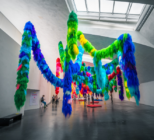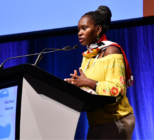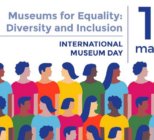During the opening ceremony, Hinz, spoke enthusiastically about the founding of ICOM in 1946 by a handful of passionate museum professionals, growing into today’s international organisation of more than 36,000 members. He recalled the fundamental aspirations of its founders: the promotion of standards of excellence in museums as well as international cooperation.
Alberto Garlandini, Chair of the ICOM Milan 2016 Organising Committee, said that discussing museums means discussing the contemporary era and its challenges. “The great challenge of modern museums is to have the existing cultural landscapes integrated with phenomena such as immigration and globalisation,” he said. “ICOM Milan 2016 is the last step of a journey that began three years ago.”
Nkandu Luo, Minister for Gender and Child Development of Zambia, said history’s first museum was in Africa, in Alexandria and hoped the conference would one day be held on the continent. “Africa, nevertheless, has not kept pace with the role of museums and protection of its own heritage,” he said. “Museum development is essential for both social and economic growth. Museums represent the soul and the cultural richness of a country. My wish is that soon we will be hosting an ICOM Conference in Africa, perhaps in Zambia.”
Part of the conference focused on immigration and the social role of museums with a panel moderated by the BBC arts, culture and entertainment journalist Brenda Emmanus. She highlighted the involvement of museums in subjects currently at the heart of societal concerns, as they continue to play their traditional role as guardians of collections.
Speaking about its front-line involvement with the current refugee crisis in Europe, Giusi Nicolini, Mayor of Lampedusa and Linosa, said the island had become well known for tragic stories of shipwrecks but was hoping in future I would be better known for values such as integration and welcoming. “This is why the Archeological Museum of Lampedusa wants to demonstrate how the island always has been a bridge and a connection between continents.”
David Fleming, director of National Museums Liverpool and president of the Museums Association focused on social justice in museums, including the Liverpool International Slavery Museum, the Ulster Museum in Belfast, Northern Ireland, and Galerija 11/07/95 in Sarajevo, Bosnia and Herzegovina. According to him, museums are a new social communication channel and must connect with society.
ICOM’s Disaster Risk Management Committee gathered museum-related professionals from different parts of the world that help monitor cultural heritage at risk in emergencies and stand ready to provide advice and assistance to international colleagues and their institutions upon request. ICOM also gathered its colleagues from The Blue Shield, an organisation of which ICOM is a founding member, bearing the name of the symbol used to identify cultural heritage protected by the UNESCO Hague Convention (1954), an international treaty to protect cultural goods in armed conflicts. The session on disaster risk reduction for museums highlighted the concept of common heritage threatened by natural and human-made disasters and gave examples of how museums can support their colleagues in need around the world.
The panel emphasised the importance of international cooperation and increased vigilance concerning object provenance, as the trafficking of antiquities represents a resource for terrorists.
Main Image
David Fleming talks at ICOM 2016 in Milan. Photograph by Anna Andolfatto










